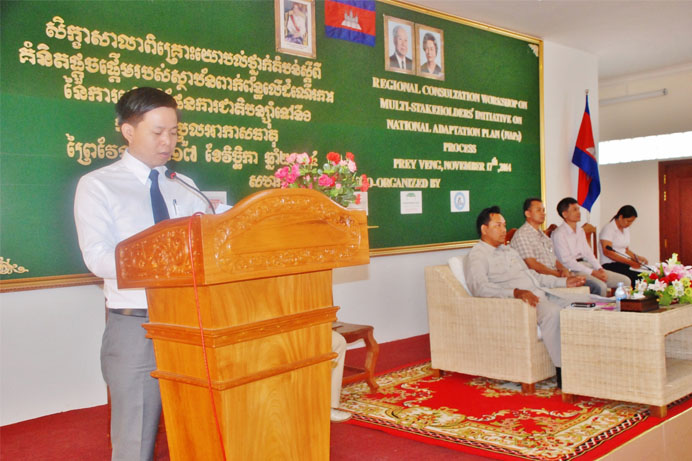
Prey Veng, November 17, 2014: Eight nine participants (29 Female) from six provinces including Prey Veng, Kompong Cham, and Phnom Penh assembled together to share their concerns in the Regional Consultation Workshop on National Adaptation Plans (NAPs), under the theme “Initial idea of civil society and community on NAPs components.” The event, organized by The NGO Forum (NGOF) brought together representatives from CSOs/NGO network members, affected communities, farmers, development partners, and the private sector to discuss this issue.
The three main objectives of the NAPs were to promote the public awareness on climate change , adaptation a national policy framework related to adaptation, and to understand the concerns of the affected communities, farmers, local authorities, , and sub national government on the impact of climate change.
“So far, under UNFCCC framework and Kyoto Protocol, the Cambodia government are in the process of developing the NAPs while many frameworks have been developed and were adopted last year such as CCCSP, Green Growth Policy, the Sectoral Climate Change strategic plan, and the National Strategic Development Plans,” said Mr. Tek Vannara, NGOF’s Executive Director. “At the same time, we have noted that the framework of the Cambodian NAP process has delayed due to several factors. Those are the Cambodia Climate Change Strategic Plan (CCCSP), climate change financing framework, and several climate mainstreaming initiatives at the sub‐national level.”
Since 2013, UNDP, UNEP and GIZ supported by Cambodia’s Ministry of Environment (MoE) has identified entry points for the Government to institutionalize Cambodia’s National Adaptation Plan (NAP) process. The main points of a NAP process as suggested by the UNFCCC and LEG Technical Guidelines are:
- To take a medium‐ and long‐term approach to reducing vulnerability to the adverse effects of climate change
- To facilitate the integration of climate change adaptation (CCA), in a coherent manner, into relevant new and existing policies, programmes and activities
- Lack of inventories of existing climate information and vulnerability assessments
- Lack of consistent climate scenarios, and limited cross‐sectorial collaboration on climate adaptation programming at national and sub‐national levels
- Lack of clear CC policy and legislation
- Limited technical and institutional capacity
- Data availability, reliability and management issues
- Limited CC awareness, limited understanding about future CC and its impacts, and GHG mitigation potential
- Limited connection between research results, policy formulation and proposed actions.
The framework of the NAP process for Cambodia has several building blocks already in place that can be enhanced to meet these two objectives. These include the Cambodia Climate Change Strategic Plan (CCCSP), climate change financing framework, and several climate mainstreaming initiatives at the sub‐national levels.
After the group discussion and consultations, the joined team had pointed out many challenges as well as the gaps in the process of NAPs in Cambodia such as:
Under the Cancun Adaptation Framework, relevant multilateral, international, regional and national organizations, the public and private sectors, civil society and other relevant stakeholders are required to undertake and support enhanced action on adaptation at all levels. The Nairobi Programme also provides a platform for parties and stakeholders from a range of organizations to collaborate on adaptation activities in various sectors, levels and regions, and manage knowledge on adaptation.